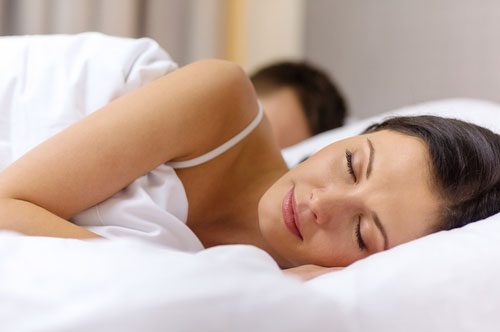What would you be willing to do for your spouse?
Would you move if he or she was offered a better job in another city? Would you do some extra chores around the house if he or she was sick or injured?
Would you try to stop snoring so he or she could sleep better?
If you have sleep apnea, you may be keeping your spouse awake every night with your constant, loud snoring. If you can imagine trying to sleep with someone turning a vacuum cleaner on and off every few minutes, then you may understand what your spouse is dealing with on a nightly basis.
We help patients with sleep apnea (and their spouses) from Georgetown, Richmond, and anywhere else within driving distance of any Beaumont Family Dentistry location in Lexington.
Our hope is that if you aren’t willing to treat your sleep apnea for your own health, then maybe you will treat it to help the love of your life.
Do You Have Sleep Apnea?
Millions of Americans have sleep apnea and a vast majority aren’t doing anything to treat it. Why not? Most people with sleep apnea do not realize they have it.
According to the American Sleep Apnea Association, approximately 22 million Americans suffer from sleep apnea. However, 80 percent of them do not know they have sleep apnea because they have never been diagnosed.
That’s close to 18 million Americans who are doing nothing about their sleep apnea. That’s also potentially 18 million spouses who are being kept awake because the person lying just a few feet away from them is snoring away all night.
If your spouse is often irritable in the morning, this can be a direct result of not getting enough healthy sleep (more on this in a moment).
We have heard of some people getting earplugs to wear when they go to bed, but we don’t think you want your spouse to do that, do you?
What Is Healthy Sleep?
Deep sleep is healthy sleep. You may not be getting to the deep stages of sleep if you are waking up repeatedly or if someone else is waking you up.
In 1910, the average American slept for nine hours per night, according to the sleep apnea association. As of 2004, 30 percent of Americans were sleeping fewer than six hours nightly.
That’s a lot of missed sleep, much less quality sleep.
Throughout the night, people who get healthy sleep will cycle through various stages of sleep.
The first stage is the time when you are starting to drift off for the night. In the second stage, your body becomes more relaxed.
As you enter the third stage, your blood pressure drops, you body temperature drops, and your heart rate slows down. Many experts believe this deep sleep is the most refreshing stage in the sleep cycle, and that it’s the time with our bodies recover from the previous day.
The final stage is REM sleep. REM stands for rapid eye movement, and this is the stage when we dream. Even if you don’t remember the details of your dreams, this is a time when our minds are very active.
Now, if someone was waking you up frequently, then you may never get to the deepest stages of sleep or REM sleep. In the morning, you may wake up feeling just as tired as when you went to bed.
Should You Get A Sleep Study?
Men over 40 and people who are overweight have a higher risk of developing sleep apnea. To know if you have sleep apnea, however, you need to undergo a sleep study.
Before you do that, you need to understand the symptoms of sleep apnea, such as:
- Frequent, loud snoring
- Frequent pauses in your breathing while you are asleep
- Frequently waking up feeling short of breath
- Frequent daytime sleepiness
- Trouble staying focused on work
Your spouse can tell you about some of these symptoms. When you sleep apnea, you can stop breathing for up to 30 seconds at a time.
In response, your body will wake you up so you breathe again. In other words, your sleep apnea could be preventing you from getting healthy sleep, too.
How To Get Treated
If you are experiencing the symptoms described above, you should undergo a sleep study. Beaumont Family Dentistry can help you arrange a study if you aren’t sure where to go.
When your sleep apnea is confirmed, we can help with your treatment. CPAP machines remain the most common treatment, but the American Academy of Sleep Medicine approved the use of oral appliances (mouthguards) as a sleep apnea treatment in 2006.
The important thing is that you find a treatment that you will actually use. This will stop your snoring, keep you breathing while you are asleep, and allow you — and your spouse — to get the deep, healthy sleep that you both need.
To get started, contact the Beaumont Family Dentistry in Lexington that closest to you. We have dentist offices in Beaumont Centre Circle, Leestown, and Hamburg.

